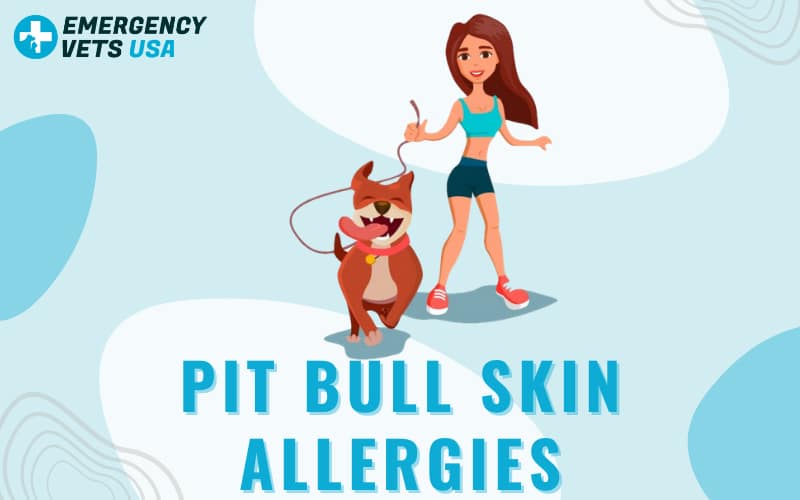Everything You Need To Know About Pit Bull Skin Allergies
If you have a Pit Bull in your life, there is a chance that your pup has experienced a form of skin irritation at some point.
Pit Bulls are prone to developing skin conditions, whether it’s due to environmental allergens or something more.
To help you better understand your Pittie, let’s discuss everything you need to know about Pit Bull skin allergies.
Ranging from typical causes to treatment methods, let’s get into our detailed guide!
Are Allergies Common In Pit Bulls?

Unfortunately, allergies are common in our Pit Bull friends.
Their short coat makes them extremely susceptible to environmental allergens, leading to skin irritation in many Pit Bull pups.
Not only are allergies common in Pitties, but they are more likely to develop zinc deficiency as well.
With these factors combined, many Pit Bulls struggle with dry and irritated skin as a result.
Don’t want to read this entire article? Watch our short video on Pit Bull Skin Allergies on this page.
Common Pit Bull Skin Problems
Pit Bulls can experience skin irritation due to multiple causes.
With having such a short and flat coat, this breed is more likely to fall victim to potential allergens in the world around them.
To help you get to the bottom of your dog’s skin problems, let’s discuss the most common factors below.
Allergies
Pit Bulls can experience multiple forms of allergies that cause a list of irritating symptoms.
While it may seem like contact allergens are the only form of allergy that can cause skin irritation in dogs, this is actually not the case.
All forms of canine allergies can have an impact on a dog’s skin and coat health, even if the allergen never makes contact with the skin itself.
Our Pit Bull friends can experience environmental allergies, contact allergies, and even food allergies. Each of these conditions can result in:
- Skin irritation
- Dry skin
- Skin redness
- Inflammation
- and secondary skin infections when these issues are not addressed
If your Pit Bull experiences long term skin irritation without relief, it’s best to speak with your vet about the possibility of canine allergies.
Most vets will first discuss the use of allergy treatment going forward, and the potential of pursuing allergy testing if your Pittie does not respond to treatment.
Most Pit Bulls do well with the use of daily allergy medication, or even monthly injections that diminish their current irritations.
If these options are not successful, some pups will need to begin an elimination diet to rule out any potential food allergies.

Ectoparasites
The most common cause of itchy skin in dogs is the presence of ectoparasites, or the skin irritation they leave behind.
Contact with even one flea can be enough to cause a severe allergic response in dogs, leading to an array of skin irritation to follow.
While flea prevention can prevent flea infestations, some only work by killing the flea once it bites the skin.
This method is effective, but it does not prevent any flea bite irritation.
If a Pit Bull is allergic to fleas, this can still lead to flea allergy dermatitis.
Irritation from fleas will often appear as skin irritation on the legs or in the area around the base of the tail.
Dogs will often frantically bite at this area, leading to potential fur loss and infection in some cases.
Flea allergy dermatitis will often require veterinary attention due to the severe irritation that is left behind.
Not only can your vet address any current fleas that are present, but can offer the best support for any current irritation or infection.
Dry Skin
Some Pit Bulls struggle with dry and itchy skin.
Just like you and I, some dog’s skin is simply more dry than others.
This can be further irritated in certain weather, during certain seasons, and even when using new shampoos or other products.
Dry skin is not only itchy for a dog, but can lead to secondary infection due to constant scratching.
Skin Infections
Skin infections are a secondary problem to initial skin irritation.
When a dog has itchy skin, they often resort to biting and scratching to ease their discomfort.
Dogs do not understand how damaging this can be to their skin, causing them to scratch and bite to the point of severe irritation.
Not only can the scratching cause damage in itself, but can welcome new bacteria into the skin.
This is how secondary skin infections are formed, causing a vicious cycle of discomfort.
Skin infections often present with inflammation, oozing, flaking, and even odor.
Infected areas of the skin may even begin to develop hot spots, which is a painful skin condition that is caused by excessive licking or scratching in one area.
Skin infections often require medical intervention, as this can be challenging to treat without antibiotics.
Zinc-Responsive Dermatosis
Pit Bulls are more prone to developing a condition known as Zinc-responsive dermatosis.
This is a condition that is most often seen in large breed dogs, and develops as a result of the body’s inability to absorb zinc properly.
This can also develop if a dog does not receive enough zinc in their diet.
Dogs with a zinc insufficiency can experience dry skin, a dull coat, and even fur loss.
Hair loss and flaking around the mouth and eyes is particularly common, causing a typical pattern that is easier for a professional to identify.
If you fear that your Pit Bull has zinc-responsive dermatosis, it’s best to contact your vet for further advice.
They are the only ones that can properly identify the condition, as well as offer a safe dose of daily zinc.
How To Solve Pitbull Skin Problems
Skin problems can be a lifelong nuisance for so many canine friends.
If you happen to have an itchy Pit Bull in your life, there are a few ways to offer them the comfort they deserve.
Stay Up To Date On Preventative Care
One of the best ways to prevent further skin irritation in your canine friend is by staying up to date on their preventative care.
Fleas can cause a world of discomfort for a dog, making any previous skin conditions even more severe.
By keeping your pup on proper flea and tick prevention, you can prevent any further complications from crawling critters.
Ask Your Vet For Advice
It’s always best to speak with your vet at the first sign of skin irritation.
Your veterinarian can guide you in the right treatment direction for your Pittie, and potentially shorten their time of discomfort.
Not only can your vet offer your dog proper treatment, but they can diagnose any issues you were unaware of.
No matter how minor your dog’s issues may seem, it is always best to seek professional advice.
Offer Soothing Baths
Soothing baths can be wonderful for Pit Bulls with dry and irritated skin.
Calming ingredients can offer much needed relief when applied to the skin, helping to ease your dog’s discomfort as they heal.
Some of the best soothing dog shampoos include ingredients like oatmeal, aloe, coconut, honey, and lavender.
You can also purchase soothing shampoos at your veterinary office, many of which contain medications to target dry skin at the source.
Brush Them Frequently
Brushing your Pittie can be a simple, yet effective way to soothe their troubled skin.
Frequent brushing helps to stimulate oil production on the skin, leading to a healthier and more hydrated coat.
Though your dog’s fur may be short, a few short brushing sessions a week can make a huge difference for your pup.
Final Thoughts
Our Pit Bull friends may be more prone to skin allergies than other breeds, but there are many ways to offer them comfort.
Be sure to review the information that we discussed above, and you can stay on top of their skin and coat health going forward.

My name is Amber. I am a dedicated animal lover that turned my passion into my career. I am a Licensed Vet Tech with 12 years of experience in veterinary medicine, but I recently took my career online to help spread accurate information on animal care. With how vast the online world is, I have a strong desire to ensure that the reader always walks away with helpful pet advice. With the experience I’ve gained from my time in this field, I have been able to travel the world, offering my services to as many animal rescues as I can find. If I am not at my laptop, or back home visiting family, you can find me somewhere in the world, cuddling every furry friend that I can find! More About Us

Hi! I Have an approximately 3-4 yo blue nose pit rescue whose life is probably miserable with allergies… a blood test revealed cats,pollen,grass, etc. resulting in a serum to be given sublingual (impossible). he is extremely touch sensitive… bathing,petting,brushing, is impossible. Prednisone helps but my vet won’t prescribe ongoing. Ends up with pred and antibiotics. Apoquel and cytopoint don’t seem to help. It’s even been suggested I put him down. I can’t do it. Is there any other help?